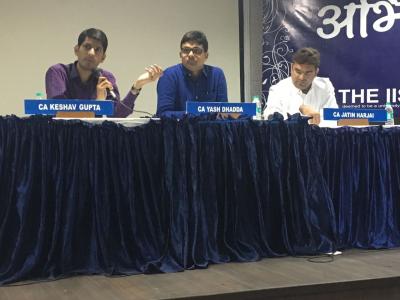PANEL DISCUSSION ON GST

PANEL DISCUSSION ON GST
Wednesday 5th October 2016
10:30 am
On Wednesday Department of Economics along with Department of Management organized the panel discussion on GST. They invited CA Jatin Harjai, CA Yash Dadda and CA Keshav Gupta for introducing the concept of GST and its impact on Indian economy. CA Yash Dhadda is a fellow member of The Institute of Chartered Accountants of India. He is associated with M/s Dhadda & Co as Senior Partner (Taxation). CA Jatin Harjai is a practising Chartered Accountant based out of Jaipur. He has expertise as a knowledgeable professional, advisor, & consultant in the field of financial consultancy and tax advisory.
The discussion started with CA Jatin Harjai introducing the concept of GST. He discussed about Goods and services tax and its various types. He explained the various types of taxes in a very simple example of automobiles. He explained the various concepts like VAT, CST, Excise duty, Luxury Tax, Service Tax, Entertainment tax etc. He also told about the India’s tax structure complications because of which investors leave investments in India. He thus emphasized on the importance and benefits of GST. He ended his discussion part with informing that GST is not tax to manufacture, sale , entry, admission, luxury or provision but tax on the supply of goods and services.
CA Yash Dadda conducted the second part of the discussion. He stressed at the point that, “Is GST really a single tax?” He basically informed about the disadvantages of GST. He told about why customs duty is called customs duty. He sarcastically said that it was in our tradition that people used to bring gifts for kings when they use to meet them so following that tradition we are also paying customs duty. He emphasized on one tax problem because of federalism in our country. He introduced the concept of uniform tax structure and polling of sovereignty of states at the center. He told about central GST, State GST, and integrated GST. He said that manufacturing states will have problem of GST as states purchasing will get GST not the states that are manufacturing. He also informed about the GST council, Union list, State list and Concurrent list. He ended his discussion part by talking about Intra-state supply and Inter-state supply and the respective taxes implied on these supplies.
The third speaker was CA Keshav Gupta who talked about impact of GST on various sectors. He told that to register for GST registration has to be done and he told about the threshold for registration. He also told the advantages and disadvantages of registration. He also talked about who is liable to pay GST - suppliers and recipient of goods and service and features of audit under GST - turnover based audit and special audit. Coming to the point of impact of GST he informed that there is no exemption on test i.e. the burden to pay taxes will increase for consumer durables and textile/garments. Presently no tax is imposed on education sector i.e. school and colleges are not taxed for the services provided but after GST taxes will be paid on inputs. In case of banking and financial sector after GST will be implied tax horizon will expand. Small enterprises will be more compliance to pay tax as threshold limit will be free. And for automobiles taxes will be reduced from 30-40% to 20-23%.
The takeaways of panel discussion were that tax evasion will not be there, inflation will be controlled, multiple taxation will be reduced, increase in employability, compliances to pay taxes will increase and last but not the least no cascading effect. The panel discussion ended with questions asked by students of both the department who enthusiastically cleared all their queries by the help of our chief guest.
Thus, the discussion proved to be very informative and it was very helpful for all the students who attended the session.

